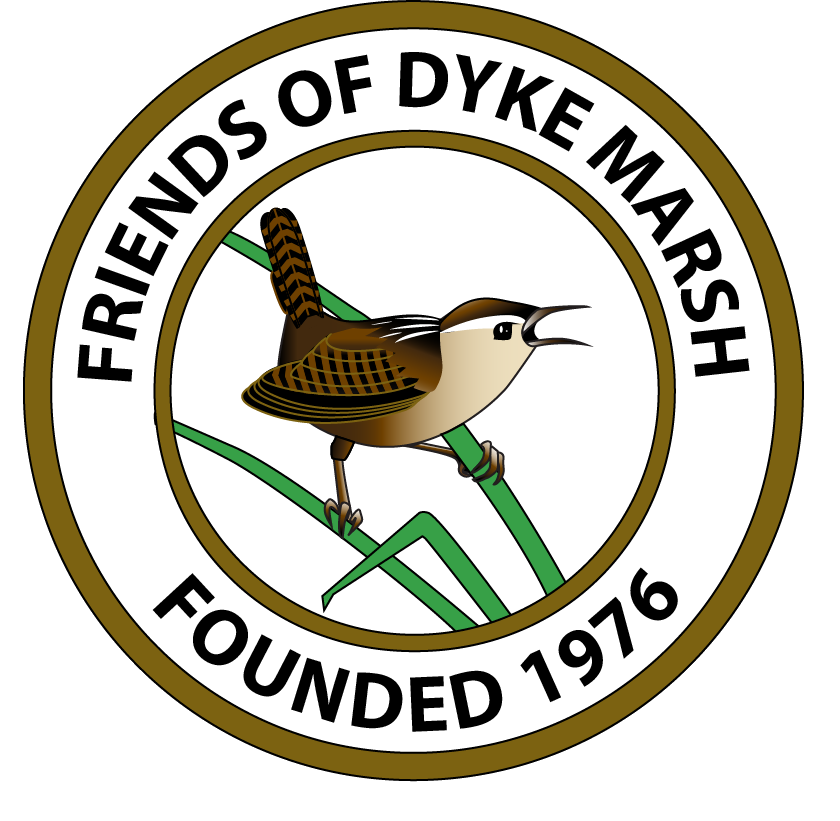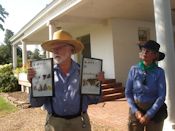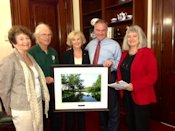 FODM presented pictures of the Dyke Marsh Wildlife Preserve to our federal elected officials, in appreciation of their support of our efforts and the preserve: Senators Mark Warner and Jim Webb and Congressmen Jim Moran, Gerry Connolly and John Dingell. On August 1, FODMers Glenda Booth, Ned Stone, Trudi Hahn and Dorothy McManus met with Senator Tim Kaine and gave him a photograph of the marsh, taken by Ned Stone.
FODM presented pictures of the Dyke Marsh Wildlife Preserve to our federal elected officials, in appreciation of their support of our efforts and the preserve: Senators Mark Warner and Jim Webb and Congressmen Jim Moran, Gerry Connolly and John Dingell. On August 1, FODMers Glenda Booth, Ned Stone, Trudi Hahn and Dorothy McManus met with Senator Tim Kaine and gave him a photograph of the marsh, taken by Ned Stone.
News
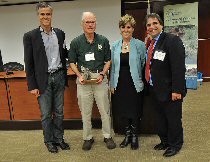 Ned Stone receives the Potomac Champion Award. Photo: Alice Ferguson Foundation.FODM Vice President Ned Stone received the Potomac Champion Award at the Alice Ferguson Foundation's 8th Annual Trash Summit on October 18, 2013. Lori Arguellles, Executive Director of the foundation, lauded Ned's untiring efforts to remove trash from the Potomac River and the Dyke Marsh Wildlife Preserve. “Whether he's cruising along Belle Haven Marina in his kayak with DC Surfriders or making upgrades to the Dyke Marsh Wildlife Preserve, he graciously works to mold a future generation of environmental stewards,” she commented. She also cited Ned's work to control invasive plants and lead nature walks.
Ned Stone receives the Potomac Champion Award. Photo: Alice Ferguson Foundation.FODM Vice President Ned Stone received the Potomac Champion Award at the Alice Ferguson Foundation's 8th Annual Trash Summit on October 18, 2013. Lori Arguellles, Executive Director of the foundation, lauded Ned's untiring efforts to remove trash from the Potomac River and the Dyke Marsh Wildlife Preserve. “Whether he's cruising along Belle Haven Marina in his kayak with DC Surfriders or making upgrades to the Dyke Marsh Wildlife Preserve, he graciously works to mold a future generation of environmental stewards,” she commented. She also cited Ned's work to control invasive plants and lead nature walks.
The Trash Summit is a forum of elected officials, government agencies, non-governmental organizations, businesses and citizens gather to develop approaches to reduce litter and waste in the Potomac watershed.
Congratulations Ned!
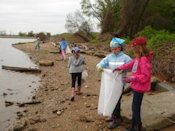 Ten enthusiastic Girl Scouts from Troop 2459 visited the Dyke Marsh Wildlife Preserve on April 28, 2015 and cleaned up trash along the shoreline. They are working on an animal habitat badge. Their
Ten enthusiastic Girl Scouts from Troop 2459 visited the Dyke Marsh Wildlife Preserve on April 28, 2015 and cleaned up trash along the shoreline. They are working on an animal habitat badge. Their 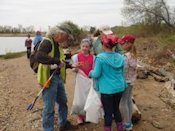 troop leader is Sarah Olson and they are based at Fort Hunt Elementary School in the Mount Vernon area. FODM President Glenda Booth, Vice President Ned Stone and FODMer Patty McCarthy talked about the harm of trash on wildlife and habitat.
troop leader is Sarah Olson and they are based at Fort Hunt Elementary School in the Mount Vernon area. FODM President Glenda Booth, Vice President Ned Stone and FODMer Patty McCarthy talked about the harm of trash on wildlife and habitat.
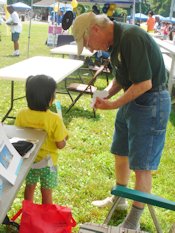 FODM Vice-President Ned Stone helps a youngster make a bird.On June 20, 2015, the Friends of Dyke Marsh spread the news about the Dyke Marsh Wildlife Preserve to new friends and old at the annual Gum Springs Community Day. Gum Springs is a historic community in the Mount Vernon area of Fairfax County founded by West Ford, a freed slave, in 1833.
FODM Vice-President Ned Stone helps a youngster make a bird.On June 20, 2015, the Friends of Dyke Marsh spread the news about the Dyke Marsh Wildlife Preserve to new friends and old at the annual Gum Springs Community Day. Gum Springs is a historic community in the Mount Vernon area of Fairfax County founded by West Ford, a freed slave, in 1833.
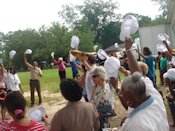 FODMers joined others in a "hats off" salute to the Fairfax County Police.
FODMers joined others in a "hats off" salute to the Fairfax County Police.
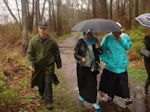 On April 14, 2015, FODM and the National Park Service led a group of Iraqi officials and scientists on a walking tour of Dyke Marsh. FODM is honored to have had these visitors. FODM president Glenda Booth has written an article that was published in the April 22, 2015 Mount Vernon Voice newspaper. Click here to view the photos and read the entire article.
On April 14, 2015, FODM and the National Park Service led a group of Iraqi officials and scientists on a walking tour of Dyke Marsh. FODM is honored to have had these visitors. FODM president Glenda Booth has written an article that was published in the April 22, 2015 Mount Vernon Voice newspaper. Click here to view the photos and read the entire article.
Pollinators visit flowers for nectar and pollen and when visiting flowers, they move pollen from one flower to another of the same species to produce fertile seeds. Most flowering plants are pollinated by bats, bees, butterflies, flies, beetles, and other animals. Plants can also be pollinated by wind and water and self-pollinate.
Animal pollinators face many challenges, including pollution, pesticides, habitat loss, invasive plants, disease, parasites and climate change.
